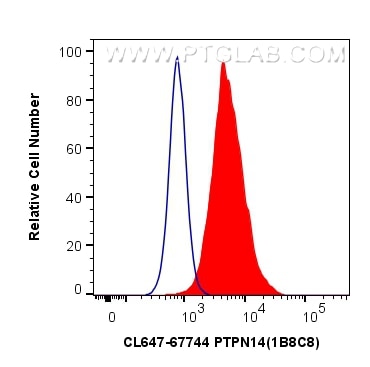Anticorps Monoclonal anti-PTPN14
PTPN14 Monoclonal Antibody for FC (Intra)
Hôte / Isotype
Mouse / IgG1
Réactivité testée
Humain
Applications
FC (Intra)
Conjugaison
CoraLite® Plus 647 Fluorescent Dye
CloneNo.
1B8C8
N° de cat : CL647-67744
Synonymes
Galerie de données de validation
Applications testées
| Résultats positifs en cytométrie | cellules HeLa |
Dilution recommandée
| Application | Dilution |
|---|---|
| Flow Cytometry (FC) | FC : 0.40 ug per 10^6 cells in a 100 µl suspension |
| It is recommended that this reagent should be titrated in each testing system to obtain optimal results. | |
| Sample-dependent, check data in validation data gallery | |
Informations sur le produit
CL647-67744 cible PTPN14 dans les applications de FC (Intra) et montre une réactivité avec des échantillons Humain
| Réactivité | Humain |
| Hôte / Isotype | Mouse / IgG1 |
| Clonalité | Monoclonal |
| Type | Anticorps |
| Immunogène | PTPN14 Protéine recombinante Ag12679 |
| Nom complet | protein tyrosine phosphatase, non-receptor type 14 |
| Masse moléculaire calculée | 1187 aa, 135 kDa |
| Poids moléculaire observé | 150 kDa |
| Numéro d’acquisition GenBank | BC101754 |
| Symbole du gène | PTPN14 |
| Identification du gène (NCBI) | 5784 |
| Conjugaison | CoraLite® Plus 647 Fluorescent Dye |
| Excitation/Emission maxima wavelengths | 654 nm / 674 nm |
| Forme | Liquide |
| Méthode de purification | Purification par protéine G |
| Tampon de stockage | PBS avec glycérol à 50 %, Proclin300 à 0,05 % et BSA à 0,5 %, pH 7,3. |
| Conditions de stockage | Stocker à -20 °C. Éviter toute exposition à la lumière. Stable pendant un an après l'expédition. L'aliquotage n'est pas nécessaire pour le stockage à -20oC Les 20ul contiennent 0,1% de BSA. |
Informations générales
PTPN14 (tyrosine-protein phosphatase non-receptor type 14) is also named as PEZ and belongs to the protein-tyrosine phosphatase family and non-receptor class subfamily. It is a multi-domain protein expressed in breast, kidney, skeletal muscle, lung, placenta, and characterized by an N-terminal FERM domain and a C-terminal PTP domain with an intervening sequence containing an acidic region and a putative SH3 domain-binding sequence (PMID: 21701840). Defects in PTPN14 are a cause of choanal atresia and lymphedema (CHATLY).
Protocole
| Product Specific Protocols | |
|---|---|
| FC protocol for CL Plus 647 PTPN14 antibody CL647-67744 | Download protocol |
| Standard Protocols | |
|---|---|
| Click here to view our Standard Protocols |


